British people arriving home from 30 “high risk” countries will have to undergo a 10-day hotel quarantine at their own expense, as the United Kingdom tightens border controls to try to curb one of the world’s worst Covid-19 outbreaks.
Announcing the measure, Prime Minister Boris Johnson said that the tougher new rules would apply to travelers from “red list countries where we have particular concern about new variants.”
Non-UK residents will be refused entry, while British citizens and permanent residents will be picked up straight from the airport and transferred to government-provided accommodation where they will begin their mandatory stay.
Meals and hotel expenses in what is one of the world’s most expensive cities could end up costing travelers more than $2,000 for a 10-day quarantine.
The announcement came the same week the UK reached the grim milestone of 100,000 coronavirus deaths – the first country in Europe to do so.
Johnson also said that travelers will be questioned as to their purpose for travel. “I want to make clear that under the stay-at-home regulations it is illegal to leave home to travel abroad for leisure purposes and we will enforce this at ports and airports by asking people why they are leaving and instructing them to return home if they do not have a valid reason to travel,” he said.
UK Home Secretary Priti Patel later announced that people wishing to travel out of the UK will have to first make a declaration proving that their journey is essential.
It comes on top of the January 18 announcement that all travelers entering the UK, including British citizens, must present a negative Covid test taken within 72 hours of arrival. Prior to that date, the borders had been open with no test requirements.
The UK Department for Transport list mostly includes countries where the South African and Brazilian variants of coronavirus are believed to be spreading, as well as countries with strong travel links to South Africa and Brazil. However, the travel ban includes some exceptions, while some notable countries are excluded.
The United States, France, and Israel are not on the banned list, although the South African or Brazilian variants of coronavirus have been detected there.
Portugal is the only European country on the UK’s list and was included because of its strong travel links to Brazil, British Transport Secretary Grant Shapps said earlier this month.
Yet the European Centre for Disease Prevention and Control and WHO have warned about coronavirus variants reported in other European countries.
The banned list also includes some countries with no direct flights to the UK, such as Venezuela, Seychelles, and the Democratic Republic of Congo. But because the travel ban and hotel quarantine policies also apply to anyone who has transited through the list of banned countries in the last 10 days, it also applies to passengers with connecting flights or those who have arrived via a third country.
UK residents, meanwhile, have been under stay-at-home orders since January 4, and many citizens returned from overseas on repatriation flights closer to the beginning of the pandemic, so it seems unlikely there is a large number of UK citizens and residents seeking to return home at this time.
The new policy might take weeks to come into effect, as the new accommodations are not yet ready. Said Johnson, “The Department of Health and Social Care is working to establish these facilities as quickly as possible.”
The policy was criticized by Nick Thomas-Symonds, a senior lawmaker from the opposition Labour party, who said the announcement was “too little too late” and called for “comprehensive hotel quarantining.”
Thomas-Symonds has also made calls for the government to announce a sector support package for aviation.
Heathrow Airport, the UK’s largest airport, said it fully backs any measures that protect public health but called for more fiscal aid.
“Aviation will play a vital role in delivering the Government’s ambitions for Global Britain, leveling-up and a green recovery, but only if it survives – now we need 100% business rates relief, an extension to the furlough scheme and a road map to reopening borders safely,” said Heathrow in a statement to CNN.
Gloria Guevara, president and CEO of the World Travel & Tourism Council (WTTC), responded to the UK government’s latest proposal in a statement.
“We firmly believe testing on departure and arrival for all travelers is the only way to halt the spread of the virus in its tracks, while still allowing negative testing passengers to travel in safety and restore international mobility,” she said.
“The government must be transparent about the metric used to label a country as ‘high risk,” she added. “It is also vital we have a clear exit strategy and more details on its testing on arrival policy.”
Read the full article here


